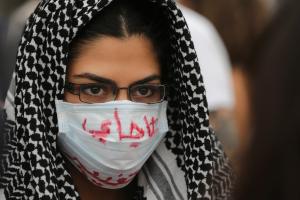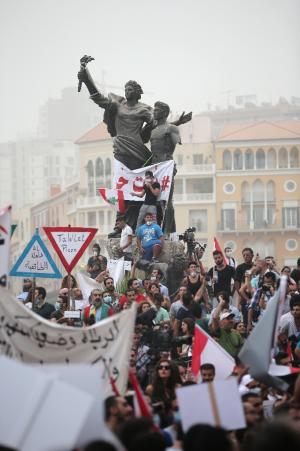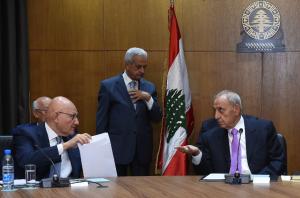By Dana Balloutt BEIRUT—Anti government activists in Lebanon were reviewing Thursday a plan by authorities to end a long-running trash-collection crisis that has galvanized public anger over the government’s chronic inability to deliver social services.
Under a plan endorsed by an emergency cabinet meeting late Wednesday, responsibility for trash pickup and disposal will be transferred from the central government to local municipalities, closed landfills will temporarily reopened and new landfills will be opened in rural Lebanon.
By Rouba El Husseini – Beirut (AFP) – Organisers of mass protests in Lebanon over trash festering in the streets said Thursday the government’s long-awaited plan to deal with the crisis is too vague and does not meet their demands. Thousands of people have taken to the streets of Beirut in recent weeks to demand an end to long-standing political divisions that have affected even basic public services.
One of the landfills the plan proposes to temporarily reopen is Naameh, the closure of which triggered Lebanon’s largest antigovernment protests in recent years. The site, near Beirut, closed in July after residents called it an environmental hazard.
Residents near the landfill demonstrated against the proposed plan on Thursday, promising to once again block garbage trucks from entering. Protesters also gathered in the northern district of Akkar, another proposed dump site.
Since July, Lebanon’s protests have swelled into an airing of grievances over the government’s alleged ineffectiveness and corruption, including its failure to address long-standing power and water shortages. Demonstrators have also targeted Lebanon’s sectarian-based political system, which they say has contributed to paralysis in all areas of government.
In a Facebook post on Thursday, the You Stink movement, which has led the protests, said it would review the cabinet’s trash-disposal plan and make recommendations after consulting with environmental specialists.
Some political analysts said the government proposal didn’t necessarily spell the end to the crisis. The plan didn’t set out clearly how municipalities will dispose of trash in a publicly and environmentally acceptable way, said Jamil Mouawad, research associate at the Institut Français du Proche Orient.
“On one hand, they did what everyone was asking for, which is transferring the [responsibility] to municipalities,” Mr. Mouawad said. “On the other hand they weren’t clear on the conditions.”
Since the early 1990s, the private firm Sukleen has collected the garbage. Its contract with the government wasn’t renewed when it expired in July. When Naameh closed, Sukleen’s sorting plants quickly filled. With no alternative dump site, garbage collection in two governorates, Beirut and Mount Lebanon, came to a near standstill. As a result, trash piled up on Beirut’s streets.You Stink has demanded the resignation of Environment Minister Mohammad Machnouk, an end to government corruption and new parliamentary elections. Mr. Machnouk has refused to step down from office, but he resigned from the ministerial committee that was overseeing the government’s response to the crisis.Write to Dana Ballout at dana.ballout@wsj.com
Lebanon’s ‘You Stink’ campaigners trash crisis plan
By Rouba El Husseini – Beirut (AFP) – Organisers of mass protests in Lebanon over trash festering in the streets said Thursday the government’s long-awaited plan to deal with the crisis is too vague and does not meet their demands. Thousands of people have taken to the streets of Beirut in recent weeks to demand an end to long-standing political divisions that have affected even basic public services.
After a six-hour session, the cabinet announced late Wednesday measures that include handing waste management to municipalities and temporarily reopening the country’s largest landfill site.
"You Stink" campaigner Lucien Bourjeily said "our first reaction to the plan is a negative one, especially in terms of the reopening of the Naameh landfill, even if it is temporary."
Unclear, he said, is how waste management would be transferred to municipalities — a key demand of his movement.
"What happened is what the government always resorts to when it wants to calm down the street: partial solutions, 10 percent of which will be implemented," Bourjeily told AFP.
– Political divisions –
Lebanon’s political system is deeply divided between two main blocs, which has caused months of political paralysis.
One bloc is led by the Shiite movement Hezbollah, which is allied with Syria and backed by Iran. The other is headed by Sunni former prime minister Saad Hariri, who is supported by Saudi Arabia and the West.
Lebanon has been without a president for more than a year, as a divided parliament has been unable to fill the post despite meeting more than two dozen times.
The crisis began in July when the Naameh landfill closed, causing rubbish to pile up on roadsides, in parking lots and in riverbeds.
That sparked broad-based protests in Beirut, where hundreds gathered again Wednesday, despite a sandstorm, to demand a long-term solution.
Under the plan, the Naameh landfill is to be reopened for seven days to take waste already in the streets, a step that has already sparked opposition from the local municipality.
"We have unanimously decided to reject the reopening of the landfill, even for an hour," a statement said.
Some 100 residents, mostly young protesters but also sheikhs from Lebanon’s Druze minority, gathered for a brief sit-in Thursday outside the landfill.
According to the government plan, a landfill in the northern region of Akkar and one in the eastern border area of Masnaa would take in waste over the next 18 months as a medium-term measure.
The sites are already being used as local landfills, and will be adapted to meet environmental standards and accept waste from Beirut and elsewhere — a plan not everyone is happy with.
"Akkar is our heaven, not your trash dump," an activist group in the area wrote on its Facebook page.
Angry protesters gathered in the Akkar town of Abdeh to denounce the government’s strategy and insist they would not accept any trash in their region.
– Plan ‘viable’ –
During the 18 months, municipalities are to prepare the necessary infrastructure to take on all rubbish management responsibilities.
But it remains unclear how they will recycle or dump waste.
Bassam Kuntar, a member of the ministerial committee that developed the plan, said if municipalities were not ready to take over within 18 months, "the trash will be back out in the streets".
One environmental expert has cautiously approved the plan.
"The plan is viable, and it can be implemented. We can say it’s 80-percent positive," said Ziad Abichaker of Cedar Environmental, a group that specialises in recycling technology.
Abichaker said it could boost Lebanon’s recycling rate, which now stands at eight percent, while bemoaning the lack of long-term vision.
"Lebanon is a small country, and it cannot have landfills forever. What will the new generation inherit?"
On Wednesday, the country’s leading parties met for a "national dialogue" intended to address the political gridlock and particularly the presidential void.
But the session ended without any achievements, and a simple announcement that more talks would be held next week.







